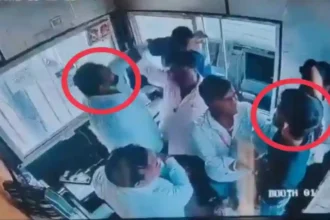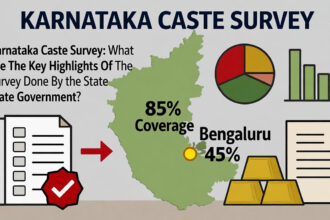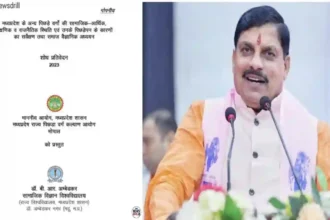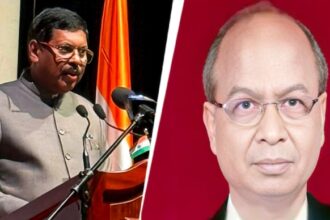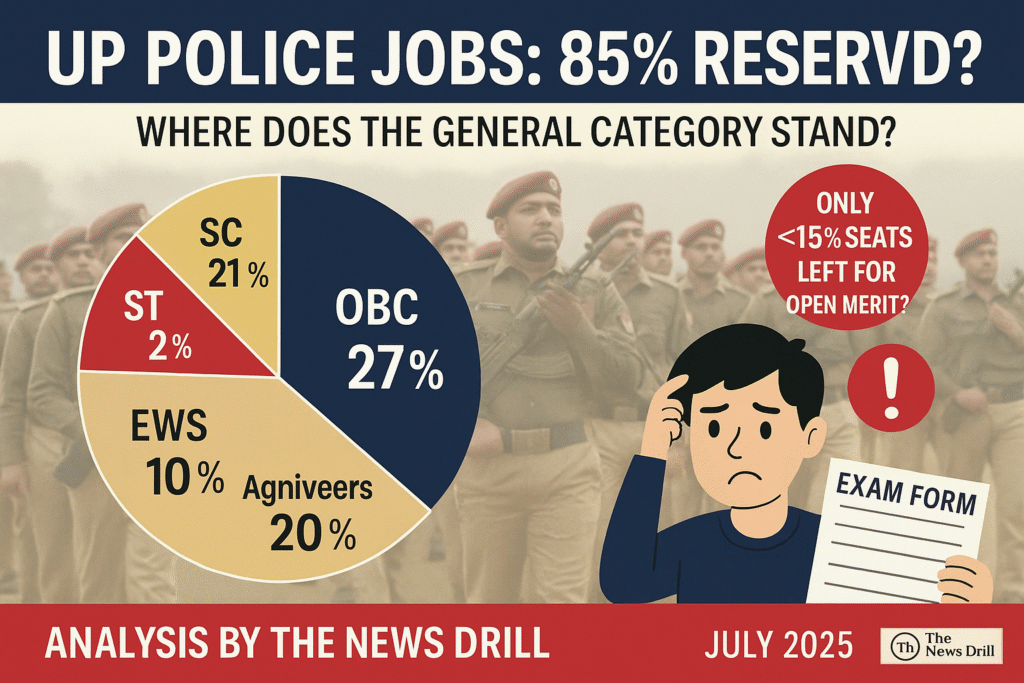
The recent decision by the Uttar Pradesh Government to grant 20% reservation to former Agniveers in direct recruitment to police forces has reignited a heated debate over fairness, merit, and the future of India’s youth especially those belonging to the Unreserved (General) Category.While the intention to resettle Agniveers after short-term service under the Agnipath Scheme seems noble on the surface, the ground-level implications of such layered reservations are far more complex and in some cases, alarming.
- The Policy Change: 20% Quota for Agniveers
- Current Reservation Structure in UP Police Recruitment
- The Real Concern: General Category Left With Bare Minimum
- Merit vs Social Justice: Has the Balance Tipped Too Far?
- But Are These Quotas Justified?
- You Can’t Just Add All Quotas Together… Or Can You?
- The Psychological Impact on Youth
- Political Silence on General Category Concerns
- What Can Be Done?
- Conclusion: A Generation Losing Faith?
The Policy Change: 20% Quota for Agniveers
On July 2025, the Uttar Pradesh government officially announced a 20% horizontal reservation for former Agniveers in recruitment to:UP Police ConstabularyProvincial Armed Constabulary (PAC)Mounted PoliceFiremenThis comes as part of a broader central and state-level push to ensure that Agniveers who serve 4 years in the Indian armed forces are not left without career options afterward, as only 25% are retained in permanent service.While this may seem justified as a rehabilitation measure, the real concern arises when this is added on top of an already saturated reservation ecosystem.
Current Reservation Structure in UP Police Recruitment
Vertical (Caste-Based) Reservations:
Category ReservationScheduled Castes (SC) 21%Scheduled Tribes (ST) 2%Other Backward Classes (OBC) 27%Economically Weaker Sections (EWS) 10%Total Vertical Quota: 60%These quotas are vertical — i.e., applied across all posts and reserved exclusively for these categories, as per constitutional provisions under Articles 15(4) and 16(4).
Horizontal Reservations (Cross-cutting all categories):
Category ReservationWomen 20%Ex-servicemen 5%Dependents of Freedom Fighters, etc. ~2% (varies)Former Agniveers (New) 20% ✅Horizontal quotas cut across all vertical categories — meaning that a 20% reservation for Agniveers is applicable within each category (General, OBC, SC, etc.), not additionally on top.
The Real Concern: General Category Left With Bare Minimum
While the government is careful to clarify that horizontal reservations don’t reduce vertical ones, the actual competition scenario tells a very different story:If you are a General Category male with no Agniveer background, not a woman, not EWS, not ex-serviceman, not under any special category — you’re competing for a sliver of remaining seats.In many districts, General Category ‘open merit’ males now compete for less than 10% of total posts effectively — while bearing no relaxation in age, fees, cut-off, or attempt limits.
Merit vs Social Justice: Has the Balance Tipped Too Far?
India’s reservation system was originally envisioned as a temporary tool for upliftment of historically marginalized communities. But over the years, what began as a remedy has evolved into a complex and politically sensitive structure — now increasingly impacting those with no “tag” to lean on.
The General Category — especially middle and lower-middle-class youth — finds itself:Excluded from most welfare schemes,Competing in highly compressed open merit pools,And now losing even those limited chances due to new special categories like Agniveer quota.
The situation becomes more critical when you look at UP’s population distribution. With over 50% belonging to OBC and SC communities, and many EWS candidates from General Category already struggling, the further segmentation threatens to wipe out fair competition altogether.
But Are These Quotas Justified?
Yes — to an extent.
Agniveers deserve support: After risking their lives and serving the nation, denying them opportunities would be unfair.
Women and ex-servicemen quotas are progressive: They aim to address gender imbalance and reintegration of soldiers.EWS quota was introduced to address economic disadvantage in the General category.
However, the combined impact of all these reservations — especially when introduced without a clear audit of availability and opportunity — leads to a zero-sum game where General Category male candidates pay the price for every new inclusion.
You Can’t Just Add All Quotas Together… Or Can You?
Technically, horizontal and vertical quotas intersect, not add. But in practice, they create fewer chances for unreserved, open merit candidates.
So when people say “85%+ seats are reserved,” they aren’t wrong in spirit — because the number of unreserved seats available for open competition is shrinking dramatically, especially in popular government posts like UP Police Constable.
The Psychological Impact on Youth
The message reaching students is devastating:
Your merit doesn’t matter unless you have a tag.
The motivation to study, the hope for fairness, and the trust in institutions are slowly eroding among thousands of young people — many of whom don’t have financial backing, don’t get age relaxation, and don’t have second chances.
In a competitive exam where lakhs appear for a few thousand seats, the last thing deserving students need is a shrinking pie.
Political Silence on General Category Concerns
The General Category youth, unlike caste-based or ex-servicemen groups, has no political lobby, no strong representation, and no vote-bank leverage.
Ironically, they are taxpayers, aspirants, and the backbone of the middle-class economy — yet absent from the policy priority list.
What Can Be Done?
1. Reservation Audit: The government must conduct periodic audits of the actual impact of reservations to ensure fairness and efficiency.
2. General Merit Safeguards: Ensure that a minimum percentage (say 30%) is always open to all, regardless of category.
3. Balanced Inclusion: While supporting Agniveers or other categories, don’t take away the future of those who rely only on hard work.
4. Merit Protection Laws: Introduce legal safeguards to prevent total marginalization of general/open merit candidates.
Conclusion: A Generation Losing Faith?
The issue isn’t about being anti-reservation or anti-Agniveer — it’s about balance.
A democracy survives when its youth believes that hard work leads to opportunity. But when students feel that their identity matters more than their ability, the system begins to lose legitimacy.
The question is simple:Can we build an inclusive system without being unjust to the hardworking few who ask for nothing but a level playing field?If not, we risk alienating a silent but significant generation — and that’s a cost India cannot afford.



